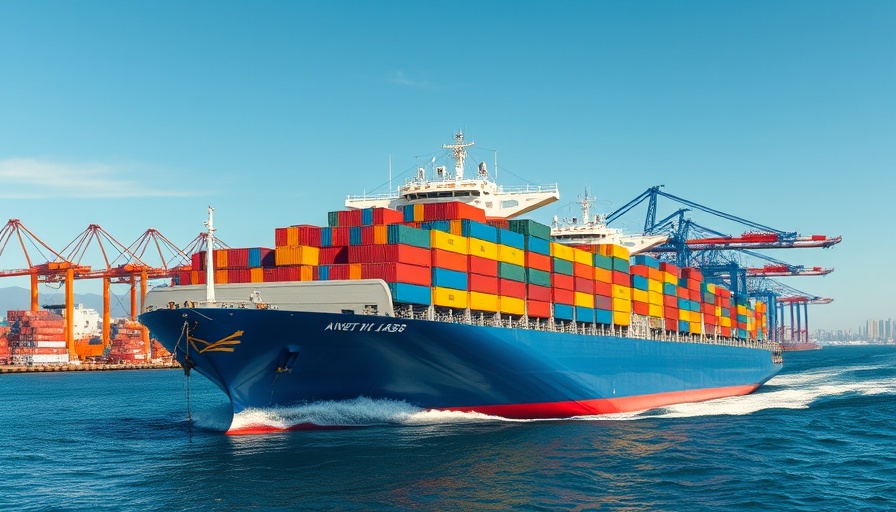
Shipping Emissions: A Divided Asia's Climate Challenge
As the global conversation around climate action intensifies, Asia finds itself at the forefront of a pivotal debate regarding the imposition of a carbon tax on the shipping industry. Recent discussions at the International Maritime Organisation (IMO) have revealed a clear split within the region, with countries like Japan and South Korea championing the tax while China and Indonesia stand firmly against it.
Background: The Push for a Shipping Emissions Levy
The context of this debate is significant; Asia is home to more than half of the world’s biggest shipowners. This makes the shipping sector a crucial contributor to regional and global greenhouse gas emissions. Japan and South Korea, along with 45 other nations, have embraced a proposal that aims to levy taxes on maritime emissions to fund climate initiatives—viewing this move as a critical step toward reducing their carbon footprint.
Conversely, countries like China and Indonesia, and COP30 host Brazil oppose the proposed levy. Their concerns hinge on the perception that such a tax would trickle down to the consumer level, leading to higher shipping costs that would adversely affect developing nations' economies, food security, and overall trade.
Insights into the Shipping Sector's Impact on Climate Change
The shipping industry accounts for approximately 3% of global greenhouse gas emissions, primarily due to its continued reliance on fossil fuels. If shipping were viewed as a single entity, it would rank as the sixth largest emitter of greenhouse gases worldwide, trailing only major industrial nations. This reality amplifies the urgency for reform within this industry.
The expected levy, projected to generate substantial revenue—estimated to be over $100 billion annually—could incentivize ship owners to transition to cleaner fuels like ammonia and hydrogen. As shown by the discussions held during the recent IMO meetings, expectations for reaching a consensus on this levy remain high, even as the details around implementation continue to be debated.
The Economic Repercussions of Shipping Emissions Tax
Countries backing the emission tax believe that a coordinated approach toward sustainable shipping can also pave the way for economic benefits, as investments in cleaner technologies could stimulate local job markets in shipbuilding and related industries. Yumin Han, a researcher with Solutions for our Climate, underscores this, stating that South Korea’s HMM and Japan's Mitsui OSK Lines have both set ambitious goals of achieving carbon neutrality by 2050.
Counterarguments: The Case Against a Carbon Tax
On the other hand, detractors argue that imposing such a tax could disproportionately impact developing nations, particularly those reliant on shipping for their economies. Brazil's pushback highlights how the carbon levy could stifle export competitiveness, making domestic goods costlier and thereby impacting the food security of vulnerable populations. This sentiment is echoed by analysts who warn that increasing shipping costs could lead to food shortages and inflated prices for basic necessities.
Future Predictions for Decarbonizing Shipping
Looking ahead, the global aim to have the shipping industry achieve net-zero emissions by 2050 will necessitate innovative solutions and technologies. However, the dominant voices in the Pacific Islands have emphasized the need for a fair and equitable implementation of any potential levy, ensuring that funds generated are directed towards climate-resistant strategies within vulnerable communities. As discussions continue, a critical balance must be struck between environmental sustainability and economic viability.
Taking Action: The Importance of Eco-Friendly Policies
As individuals and communities interested in sustainability, supporting measures aimed at reducing carbon emissions in various sectors—including shipping—is essential. Engaging in sustainable practices, advocating for climate action policies, and practicing responsible consumption are steps each person can take to contribute to a more sustainable future.
In conclusion, as the discussions on a carbon tax unfold, it is crucial that stakeholders prioritize both climate action and economic implications. The pathway to a more eco-conscious shipping industry is fraught with challenges, yet the potential gains in sustainability and economic growth make it a worthwhile endeavor. By remaining informed and advocate for balanced policies, we can play a part in shaping a greener future.
 Add Row
Add Row  Add
Add 



Write A Comment